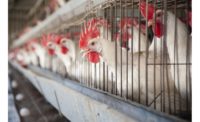Kerry has released some research on the increasing prices of eggs and what that means for the bakery industry.
The humanitarian crisis in Ukraine, soaring energy prices and the ongoing pandemic has led to inflationary pressures and meant that the economic outlook for Europe has become very uncertain. At the start of the year, experts predicted that egg prices would have stabilized throughout 2022. However, the ongoing Russia and Ukraine conflict has generated one of the worst energy crisis and as a result, raw material prices as well as energy costs needed for egg production have dramatically increased, resulting in European egg prices rising by as much as 31% per 100kg of eggs YoY, 18.4% vs last month and 6.2% vs last week (week 12, 2022)
In addition, only recently, there has been an outbreak of avian flu in the U.S. (confirmed in 22 different states) causing egg prices to surge by 52% since highly pathogenic avian influenza (HPAI)made its confirmed debut in the U.S. Around 17 million birds in the U.S. have already lost their lives as the result of the HPAI virus and HPAI control measures.
This has already become the worst avian flu outbreak in the U.S. since 2015. And this problem is likely to continue for at least a little while.
Prior to this, there was an existing animal welfare movement towards the reduction of egg content. Concerns about animal welfare and sustainability as well as egg allergies have made egg replacement and reduction an imperative for food and beverage brands.
Individual consumers, regulators and animal welfare groups are becoming increasingly vocal and influential about the ethical treatment of hens; global retailers, such as Tesco, in fact have taken actions against selling eggs from caged hens and an increasing number of bakery manufacturers around the globe committing to cage free eggs or egg reduction solutions for their bakery products.
The rising interest in egg alternative solutions has been fast-tracked by proposed EU legislation to ban cages in animal agriculture by 2027 and the growing consumer demand for vegan products, with 24% of consumers now actively looking for "vegan-friendly" claims on food and beverage products, per Innova Market Insights (2021).
This is accelerating due to the increasingly volatile egg prices across the globe. Replacing or reducing eggs with alternative solutions will allow manufacturers to achieve price stability and cost optimization as well as actively deliver on their sustainability agenda.
Kerry’s new Biobake LP technology is a novel generation of enzymes aimed at reducing egg content by up to 20% in baked goods. Biobake LP improves dough handling and crumb structure of the final product, increases volume and softness, providing a cost effective, clean label and sustainable solution for bakery manufacturers, specifically for croissants and muffins. This in turn enables manufacturers to switch from caged eggs to organic or free-range eggs without increasing production costs. Biobake LP improves final product positioning, allowing manufacturers to include ethical, cage-free, and free-range claims while also considerably reducing CO2 emissions and land use.




